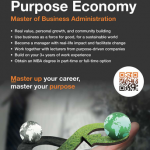Purpose Economy | Hanze UAS
Are you a business professional aiming for purpose and growth for yourself and the company or organisation you work in? Do you want to become a leader for current and future challenges in business and find solutions that benefit both organizations and society, instead of focusing on financial value alone? Join our MBA.
How does the programme provide content to ensure students achieve an understanding of a reasonably diverse set of perspectives on understanding economies?
The programme is centred around four main themes: 1. New Realities & Purpose; 2. Global Mindset for Business; 3. Strategies & New Business Models; 4. Critical & Scientific Decision-Making in Business. The programme prioritizes responsible management, climate change education and human rights, with emphasis on the advantages of digital transformation. It focuses on an individual professional impact and personal growth in the process changing economy of purpose. The Purpose Administration is your roadmap to create a better future, today. Classical economic principles, are fundamentally replaced with less ideological empirically grounded theories. In contrast, the notion of personal and social purpose now becomes the driving force behind people engaging in economic interactions.The programme is centred around four main themes: 1. New Realities & Purpose; 2. Global Mindset for Business; 3. Strategies & New Business Models; 4. Critical & Scientific Decision-Making in Business. The programme prioritizes responsible management, climate change education and human rights, with emphasis on the advantages of digital transformation. It focuses on an individual professional impact and personal growth in the process changing economy of purpose. The Purpose Administration is your roadmap to create a better future, today. Classical economic principles, are fundamentally replaced with less ideological empirically grounded theories. In contrast, the notion of personal and social purpose now becomes the driving force behind people engaging in economic interactions.The programme is centred around four main themes: 1. New Realities & Purpose; 2. Global Mindset for Business; 3. Strategies & New Business Models; 4. Critical & Scientific Decision-Making in Business. The programme prioritizes responsible management, climate change education and human rights, with emphasis on the advantages of digital transformation. It focuses on an individual professional impact and personal growth in the process changing economy of purpose. The Purpose Administration is your roadmap to create a better future, today. Classical economic principles, are fundamentally replaced with less ideological empirically grounded theories. In contrast, the notion of personal and social purpose now becomes the driving force behind people engaging in economic interactions.The programme is centred around four main themes: 1. New Realities & Purpose; 2. Global Mindset for Business; 3. Strategies & New Business Models; 4. Critical & Scientific Decision-Making in Business. The programme prioritizes responsible management, climate change education and human rights, with emphasis on the advantages of digital transformation. It focuses on an individual professional impact and personal growth in the process changing economy of purpose. The Purpose Administration is your roadmap to create a better future, today. Classical economic principles, are fundamentally replaced with less ideological empirically grounded theories. In contrast, the notion of personal and social purpose now becomes the driving force behind people engaging in economic interactions.
How does the programme ensure students understand the interaction between economic and ecological systems?
Many purpose driven organisations with concrete examples and thriving ventures are engaged during the programme to present the possible reality and impact from business into society and environment. With a direct link with the professorship in Biobased Valorisation, students are exposed to recent research in the field of economics and complex systems.
How does the programme ensure students understand how to critically explore real-world evidence, both qualitative and quantitative?
An educational concept based on neuroscience principles will bring students from a a phase of unlearning, relearning and ingraining. Based on real experiences, the brain is stimulated to visualise and understand models that are outdated in comparison with others more adjusted to the current needs for innovation.With intense exposure, discussions and applications, students will give individual meaning to the different learnings. During these phases, students are asked to explore their real context and reflect within the community of learners of this programme. This includes professionals as students, current purpose economy companies managers, lecturers, researchers and citizens. Within the structure of an applied science university and applied science research, students are requested to analyse critically data and behaviour.
What pedagogical approaches does the programme use to ensure that students examine the historical context, assumptions and values in all economic thinking?
From a “technical”, didactic perspective, both a more conventional subject based approach, combining classroom activities with integrated project activities, and a more modern Community of Learners style approach may lend themselves, provided that the contents will be adapted according to principles mentioned in the preceding sections, which implies, of course, an even greater departure from conventional textbook courses, which may provide a welcome further incentive to promote “homespun” conceptual and theoretical research and development at IBS and more generally, Hanze. Based on the top 100 list of companies subscribing to the Purposeful Economy idea in Europe alone (Hurst 2016, 235- 237, Klomp 2018), demand forecast for this program's graduates looks promising as well.
How does the department ensure that the teaching culture and capacity to deliver economic pluralism are continually improving?
Having the programme centred in four main topics and directed to specific sustainable development goals but with a dynamic structure of contents, allows for students to develop a customized path and simultaneously permeable to new insights from the community and research.
Country:
Netherlands
University:
Hanze UAS
Course name:
Purpose Economy
Department/school:
International Business School
Course level:
MBA
Course language:
English

 all programmes
all programmes